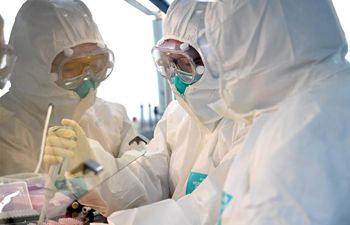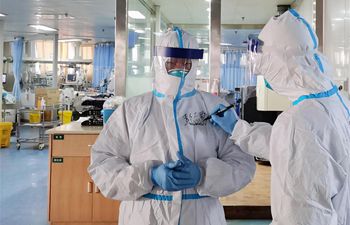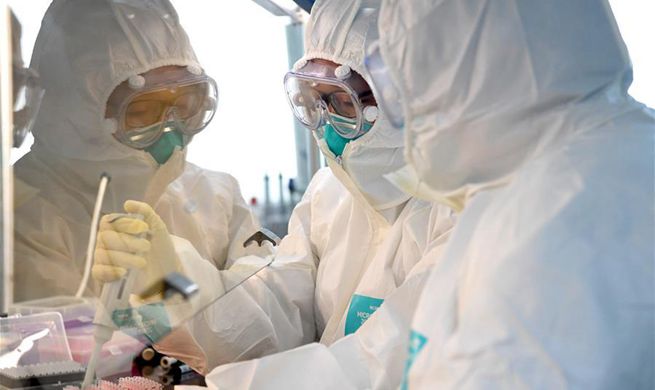CHICAGO, Feb. 6 (Xinhua) -- Researchers at Washington University School of Medicine in St. Louis have discovered that harmful Parkinson's proteins spread more rapidly through the brains of mice that have the high-risk variant of APOE, and that memory and thinking skills deteriorate faster in people with Parkinson's who carry the variant.
The findings were published in Science Translational Medicine this week.
Studying mice with a form of alpha-synuclein prone to clumping, the researchers genetically modified the mice to carry human variants of APOE - APOE2, APOE3 or APOE4 - or no APOE at all.
They found that APOE4 mice had more alpha-synuclein clusters than APOE3 or APOE2 mice. Further experiments showed that the clumps spread more widely in APOE4 mice as well. Together, the findings showed that APOE4 was directly involved in exacerbating signs of disease in the mice's brains.
To study the effect of APOE variants on dementia in people with Parkinson's, the researchers analyzed publicly available data from three separate sets of people with Parkinson's. Two of the cohorts -- one from the Parkinson's Progression Markers Initiative, with 251 patients; and the other from the Washington University Movement Disorders Center, with 170 patients -- had been followed for several years. In both cohorts, cognitive skills declined faster in people with APOE4 than in those with APOE3. People with two copies of APOE2 are very rare, but none of the three patients in the group with two copies of APOE2 showed any cognitive decline over the period of the study.
The third cohort, from the NeuroGenetics Research Consortium, was made up of 1,030 people with Parkinson's whose cognitive skills had been evaluated just once. The researchers found that people with APOE4 in the cohort had developed cognitive problems at a younger age and had more severe cognitive deficits at the time they were evaluated than people with APOE3 or APOE2.
"What really stood out is how much less affected the APOE2 mice were than the others," said Albert Davis, an assistant professor of neurology and the study's lead author. "It actually may have a protective effect, and we are investigating this now. If we do find that APOE2 is protective, we might be able to use that information to design therapies to reduce the risk of dementia."
"Parkinson's is the most common, but there are other, rarer diseases that also are caused by alpha-synuclein aggregation and also have very limited treatment options," said Davis. "Targeting APOE with therapeutics might be a way to change the course of such diseases."
APOE doesn't affect the overall risk of developing Parkinson's or how quickly movement symptoms worsen, so an APOE-targeted therapy might stave off dementia without doing anything for the other symptoms. Even so, it could be beneficial, according to Davis.
Dementia is one of the most debilitating consequences of Parkinson's disease, a progressive neurological condition characterized by tremors, stiffness, slow movement and impaired balance. About 80 percent of people with Parkinson's develop dementia within 20 years of the diagnosis.
An estimated 930,000 people in the United States live with Parkinson's, according to the study.

















